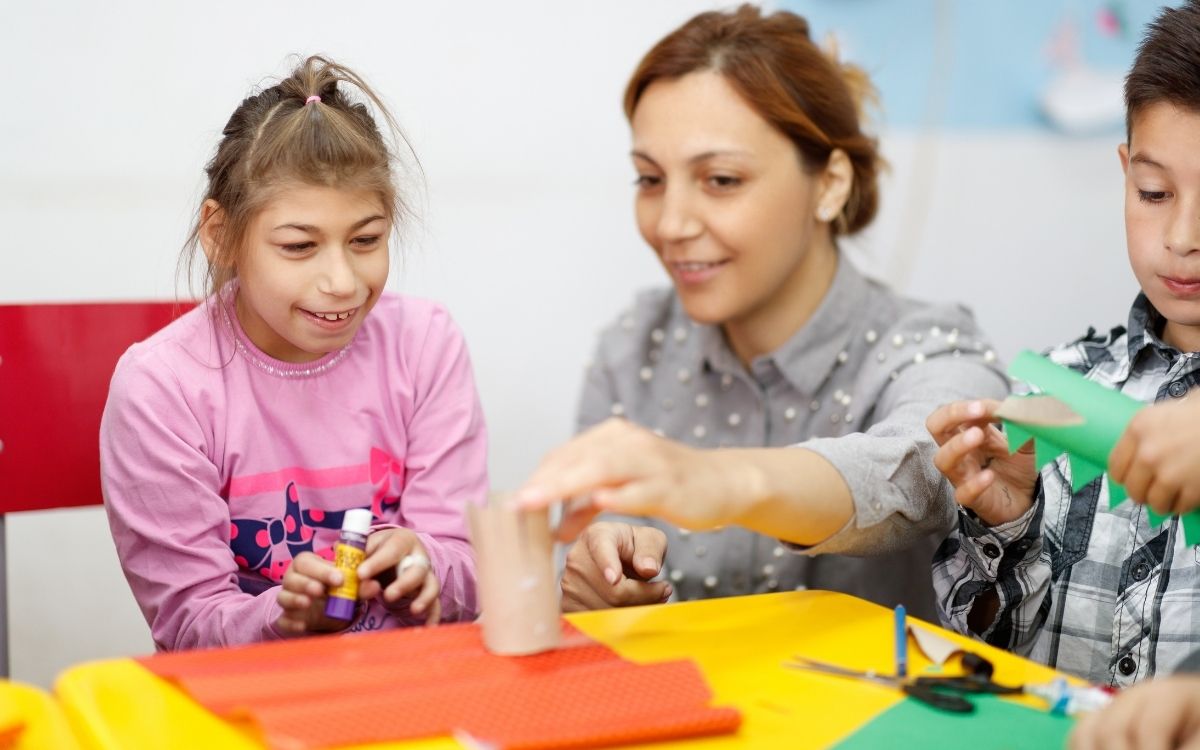As a mom to special needs kids, I fully understand the importance of having a teacher who is trained to work with children with varying abilities. We like to know that the person who spends most of the day with our children knows how to interact with and teach them in a way they can comprehend and enjoy. However, from the teacher’s perspective, how important is special education?
If a teacher earns a master’s degree in special education, not only are more doors open to job possibilities, but it could boost their earning potential. Being certified and knowledgeable to teach special education will place the teacher at the top of the candidate pool for employment. The degree gives teachers the tools to deliver person-centered education and better adjust lessons to different learning levels.
Also, there has been significant growth in the number of special education kids who study alongside their nondisabled peers rather than apart from them. If general education teachers were better equipped by obtaining more inclusion and special education training, classrooms would potentially run more smoothly, and all children, disabled and nondisabled, would benefit.
Why Being Trained to Teach Special Education Is Important According to the ADA

Generally, children who have special needs and attend public school have an Individualized Education Plan (IEP). The Individuals with Disabilities Education Act (IDEA) has a requirement that all children be taught in the least restrictive setting, meaning they are included in the mainstream classroom as much as possible. Individuals with Autism Spectrum Disorder or developmental delays and those with speech impairments or dyslexia all have IEPs and require varying amounts of help.
Though some feel that inclusive instruction – placing kids with special needs together with nondisabled children – is not that beneficial, mounting evidence states the contrary. Inclusive education has been found to elicit stronger math and reading skills, higher attendance and graduation rates, and fewer behavioral struggles. It is also known to help improve social awareness in typically developing children.
What Is the Role of the Special Education Teacher?
The prominent role of the special education teacher is to decipher what each student needs to be able to learn effectively and create a healthy, happy, and inspiring learning environment in a supportive way. They can do this by following a daily plan that usually entails:
- Teaching a small number of students inside and outside of the class
- Planning and implementing the lessons in a way that reaches all of the children
- Assessing how the student is doing
- Developing individualized teaching methods that work for each child and how they best learn
- Using special tools and interactive equipment that will stimulate interest in learning
- Using various skills such as sign language or lip reading enhances the child’s ability to learn
- Collaborating with other teachers and aids in the classroom and working together in a way that meets each of the child’s needs
- Filling parents in as to their child’s progress and suggesting ways they could help continue their education when at home
Are Special Education Teachers in High Demand?
According to the U.S. Bureau of Labor Statistics, the overall employment of special education teachers is expected to increase by eight percent from 2020 to 2030. There are about 38,600 jobs projected to be open each year.
Also, with inclusive learning being implemented more and more in the public school system and the number of students with developmental disabilities rising, there has been an urgent need for a new variety of skilled educators with the background knowledge needed to fill these positions. The market for certified teachers to teach kids with varying abilities is in high demand.
What Are the Benefits of Becoming a Special Education Teacher?
If you have the skill and patience to work with children with various disabilities, becoming a special education teacher can be quite rewarding. There are several advantages to working in special education.
More Job Choices
In every state, special education teachers are required to be licensed. Despite it being costly to continue their education, there are professional advantages to having the additional certification, mainly better employment options throughout their entire career.
Job Availability
Those qualified to teach special education will nearly always find work available in schools and have several career possibilities as a teacher in ordinary courses. Most likely, this is due to the fact that teachers often dislike teaching children with special needs and problematic behaviors. It can be a challenging position to fill. Yet, in the United States, a licensed and caring special education teacher can expect steady and growing career opportunities.
The Daily Victories

Children with varying abilities need a particular type of person who can adapt to meet their needs and teach them effectively. Because special education teachers are working with students who have difficulty learning, just the fact that they accomplished a specific task by the end of the day is a victory worth celebrating. It can also be quite rewarding to see the child’s self-esteem rise when they initially believed they couldn’t learn.
Shorter Workdays
Because the curriculum for students with disabilities is flexible, most special education teachers have a shorter school day. This can allow them to have more free time for their personal life. However, this could change as the public school system moves towards inclusivity.
Are There Any Drawbacks to Being a Special Education Teacher?
A significant drawback to becoming a special education teacher is that they tend to burn out more quickly. The high prevalence of burnout is due to the many challenging factors that often lead to teachers abandoning their jobs. It is expected that 75% of special education teachers will leave their positions within 10 years of starting.
As a result of this high turnover rate, special education instructors are in demand, and effective programs for the children they serve are lacking. While a special education teacher may begin their career to assist children with disabilities to become useful members of society, they are confronted with several obstacles that make this a challenging endeavor. Obstacles such as:
A Common Misperception That Teaching Is Easy
Teaching children with unique abilities is extremely difficult as the teacher is working with various levels of comprehension. There is also greater responsibility when working with children who have disabilities, whether they be physical or emotional. The general public does not well support special education teachers.
Responsibilities Other Than Teaching
Teachers who are trained to teach children with special needs often find they must attend more meetings, fill out more paperwork and conduct many assessments on each child. All of this takes them away from doing what they love most –– interacting and teaching the children.
No Support
There is not much awareness of the challenges special needs teachers face. School districts are experiencing high growth levels, yet special education teachers are asked to do more with less. There doesn’t seem to be much administrative support, yet their duties are increasing.
Working With Varying Disabilities
As a special education teacher, you need to be knowledgeable in various disabilities, whether they are physical that require daily maintenance routines or sensory struggles that require a special way of handling the meltdowns, so they do not accelerate. Each student’s situation is unique, and adaptations need to be made for each one.
Dealing With Death
Sometimes, students in the classroom have an incurable illness that results in death. This can be challenging to deal with as the teacher as well as helping the other students through the loss of a peer.
Teaching in an Inclusive Classroom

There are a number of challenges when teaching children with disabilities alongside nondisabled students. Trying to teach at a level that the children with special needs can comprehend while at the same time keeping the nondisabled children interested can be pretty tricky.
Another problem stems from having children unaccustomed to relating to those with differing abilities and teaching them compassion and sensitivity. The teacher is not only teaching the curriculum but also inclusivity and compassion towards those who are different.
Professional Isolation
Special needs teachers often face professional isolation from traditional teachers who often don’t view them as colleagues. They often work with smaller groups of children, focusing on different skills such as activities of daily living. This type of work can be viewed as less important by their peers.
No Support From Parents
Some parents appear to be disinterested in their children’s welfare, and the kids lack adequate care. On the other side, other parents are extremely overprotective. Both can be troublesome for the teacher. If the parents are disinterested, they have little to no interaction with their children’s teachers. Yet when the parent is overprotective, they have unrealistic expectations from their child and their child’s teacher and can appear to be quite demanding.
In conclusion, being a special education teacher can be very challenging, and it requires a lot of patience, skill, and the ability to adapt to many different personalities, strengths, and weaknesses. It involves extra learning and certification, and without the ability to regulate your own stress, it can lead to burnout. However, for those who have the gift of patience, the skill to teach differently, compassion, and understanding, it can be quite rewarding.
Related Articles
- What Are the Different Types of Special Education Services?
- Why is Teaching Rewarding and Challenging?
- 4 Different Types of Teaching Methods Broken Down
- What Is the Most Difficult Aspect of Teaching Today?




